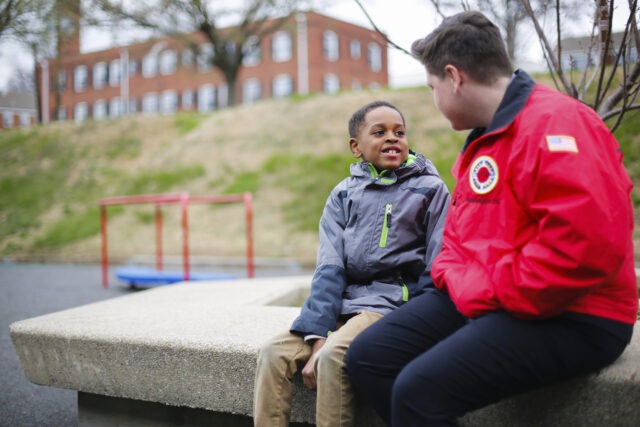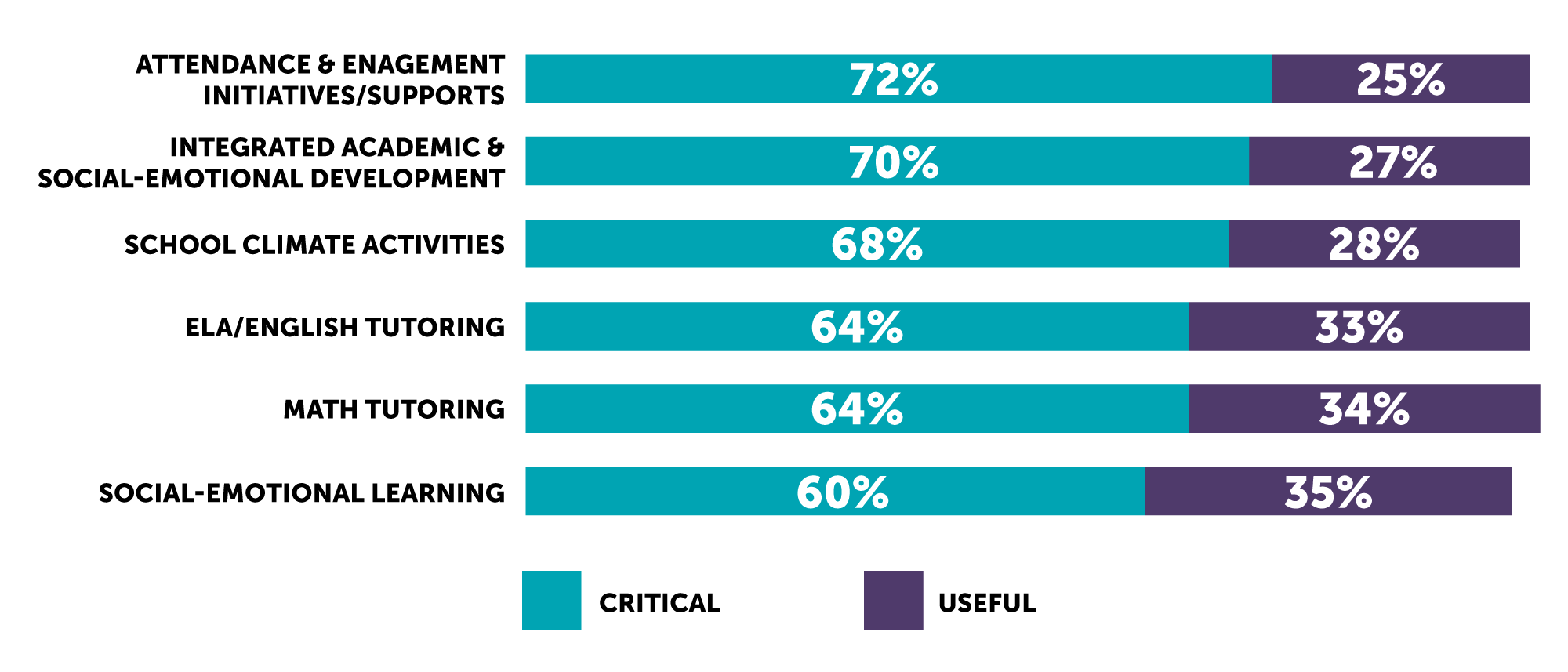What schools want and need this year
After a very challenging and disruptive time, everyone connected to schools—including students, educators, parents and school partners—is taking a deep breath as we all gear up for yet another unpredictable school year. The threat of COVID-19 persists, prolonging stress and raising difficult questions about how we can best support learning while also protecting everyone’s health.
Yet, the depth of commitment, determination and creativity of the caring adults who show up for their students every day remain steadfast. And as this school year begins, we can use two sources of information—feedback from teachers and principals, and insights and lessons learned from the past year—to help us better understand and provide what students and teachers really want and need right now.
Here’s what we have learned since March 2020.

Teachers want additional capacity.
Our 320 partner public schools say they have benefitted from the additional human capacity and relationships City Year AmeriCorps members provide as student success coaches.
Since the pandemic hit, AmeriCorps members have adapted their services to virtual platforms and helped meet local needs, serving as tutors, mentors and role models during a disruptive time for everyone in education. Teachers[1] have been vocal in their appreciation for the additional support in their classrooms.
“This was my first experience with City Year and it was great! My City Year was amazing, she supported my class in every way from engagement to their social/emotional wellbeing.” –City Year partner teacher, 2021 end-of-year survey
From delivering laptop computers to homes in the early days of COVID-19 to helping students, teachers and parents adjust to distance learning, navigate new technology, participate in online chats and complete and submit assignments, City Year AmeriCorps members showed up, every day, willing and able to help.
City Year was able to adapt its in-person training to a virtual format, keeping the focus of service on three main objectives:
- Building consistent, caring and positive relationships with students every day
- Partnering with teachers to ensure students are engaged with their learning
- Contributing to a sense of joy, stability and belonging in the school experience
We believe that more schools, especially systemically under-resourced schools that serve large numbers of students of color and students growing up in lower-income households, such as the schools served by City Year, could benefit from an infusion of student success coaches, even if those schools aren’t partnering with City Year.
My City Year member was fantastic this year. She supported me with daily lessons and had a great rapport with the students.”
–City Year partner teacher, 2021 end-of-year survey
Principals want both academic and social-emotional supports.
Schools know exactly what they want and need more of to successfully serve students this year. In an end-of-year survey we sent to our partner principals[1], these are the top six areas where they wanted additional support:

Students want a bigger say in their education.
At a time when it’s difficult to get information about how students are really doing because of pandemic-related disruptions, results from a student survey piloted at a City Year site on the West Coast in 2021 gave us some insight.
The survey showed that the majority of respondents expressed feelings of agency in their interactions with AmeriCorps members, and a majority of students also feel supported by AmeriCorps members as they navigate academic challenges this year.
- 84% of students feel that their City Year AmeriCorps member teaches them how to self-advocate and ask for help when they need it—critical skills for life and workforce success
- 79% of students feel that their City Year really listens to them often or almost always
- 77% of students say that their City Year considers their ideas when making decisions
- 76% of percent of students feel that their City Year explains things in a different way if they don’t understand it the first time, personalizing the learning experience
These results offer us an opportunity to continue to elevate student voice and support them as they reconnect with their school community, recover from the stress and disruption they have experienced, and re-engage with their learning.
The well-being and mental health of students—and adults who work in schools—need extra attention right now.
The past year and a half have taken a toll on everyone. Students, teachers and other adults who work in schools, including City Year AmeriCorps members, are no exception. More and more, people are recognizing that taking care of our whole selves, including our mental health, is crucial if we are going to be able to show up for others, and that includes actively supporting the mental health of all members of the school community.
City Year and our partners are leaning into what science and research, our own experience working in schools, and feedback has taught us and bringing these priorities and practices into our schools:
- Relationships are at the heart of learning and building community. In fact, as the report A Nation At Hope describes, learning happens in relationship with others. That’s why the partnership between a classroom teacher and an AmeriCorps member is so vital, and why the relationships corps members form with students is the bedrock of our holistic approach in schools.
- Integrating academic and social-emotional learning not only advances achievement—it enhances holistic well-being and student mental health. When a student feels safe and cared for and has a sense of belonging and purpose, they are able to learn and grow.
- Nurturing and joyful school environments benefit everyone—adults and kids. The more we can all find ways to help schools create and sustain engaging and equitable learning environments, the better students will do academically and in terms of their mental health and social-emotional development. And you can bet the adults will thrive, too.
Learn more about City Year’s unique approach to student success

Related stories
We hear time and time again from corps members and alums that when they first joined City Year as an...
Read more about A snapshot of City Year service as a student success coachAs a new City Year AmeriCorps member, you’re about to embark on a transformative journey—and it all begins with Basic...
Read more about Welcome to City Year’s Basic Training Academy: Your First Step Toward ImpactHow do you make your application stand out? Check out these tips from our recruitment staff
Read more about Tips and tricks for a great applicationCity Year Providence AmeriCorps alumnus Justin Roias knows firsthand how positive relationships with caring adults can help children succeed as...
Read more about Mentoring students: a two-way street














